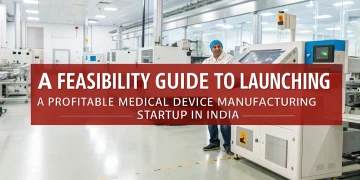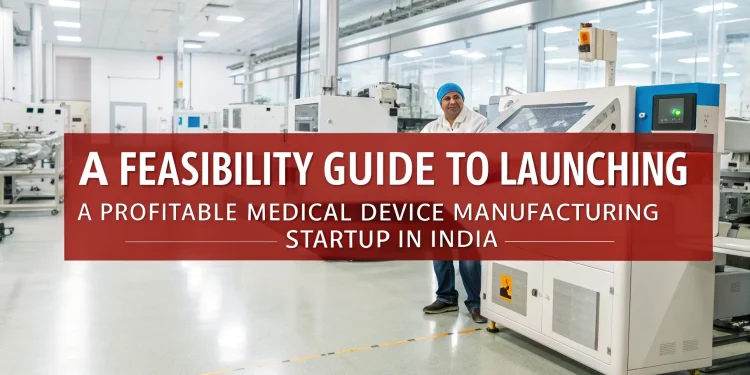The Rise of Medical Device Manufacturing in India
India’s growing healthcare system and its policies are making strides towards self-reliance in healthcare infrastructure. This has driven the focus toward indigenously produced medical devices. In turn, this opens up great business opportunities for entrepreneurs, MSMEs, and startups that actively seek to contribute toward the national healthcare advancement.
The medical device Manufacturing industry in India is projected to reach USD 50 billion by 2030. This immense growth will be enabled through addressing chronic diseases, rural healthcare expansion, and an increased population. This also means that beginning a venture focusing on manufacturing medical devices will not only be profitable but make a positive impact as well.
Grasping the Market Potential
Training and education are one of the essential healthcare services that need to be undertaken in India. Healthcare infrastructure also needs to be deeply integrated into the newly emerging economies. Reliability on imported advanced technology should be reduced and replaced with locally advanced medical imaging technology. All of these areas will positively impact diagnostics as well as the production of surgical tools, orthopedic implants, and monitoring equipment.
The advancements in preventive healthcare are spurring progress in imaging and diagnostic devices current medical technologies. In addition, as health consciousness rises, there is a poised expansion to wearable gadgets such as glucose meters and portable ECG devices.
With its strategic location, India is a skilled workforce and offers cost advantages, making it an export hub. Medical devices manufactured in India are gaining popularity across Africa, Southeast Asia, and Latin America due to their Cina their reasonable prices and decent quality.
Related: Indian Medical Devices Industry
Regulatory Framework: What You Should Know
Every business in Medtech needs to chase the proper regulations, and in India, the CDSCO is the main governing body. Under the Medical Devices Rules, 2017, all devices are classified into four risk-based categories—Class A (low risk) to Class D (high risk). Depending on your mother’s care center, your licensing options, closure requirements, and clinical validation vary.
Aside from registration, there are strict guidelines in quality control a manufacturer needs to follow. ISO 13485 is an international standard in medical device manufacturing quality control management. If planning for exports, obtaining CE marking or US FDA clearance is often needed to enter global markets.
Assessing Feasibility Before You Start
Entering the medical device manufacturing sector? Then conducting a feasibility study is the most crucial step. Look for product segments that are in high demand but have lower local supply. Study local competition, pricing benchmarks, and procurement trends from hospitals and diagnostic labs to understand their buying decisions.
Evaluate the cleanroom, high-precision molding, or sterilization unit requirements for manufacturing and if they can be sourced within the budget. Financially, prepare for the purchase of machinery, infrastructure, and labor. A mid-sized unit incurs direct capital investment of ₹8 to ₹20 crore alongside operational expenses of ₹2 to ₹5 crore per annum. Achievable breakeven with well-structured planning sits at three to five years post setup.
Choosing the Right Product Line
Carefully picking your product line is critical for success. While high-end equipment like MRI machines or surgical robots may be appealing, their capital and R&D requirements are through the roof. Prioritize better opportunities for newer companies; look for high-demand mid-tech products like orthopedic implants, patient monitoring systems, or disposable syringes.
Production for hospitals, clinics, and diagnostics chains is simpler with these devices and markets already exist for them. Furthermore, opportunity exists in innovation for Bluetooth and wearable devices. Collaborating with hospitals or medical research institutes can ensure initial sales by helping co-develop tailored solutions which guarantees initial sales.
Establishing The Manufacturing Lap
This all-important medical device manufacturing unit will be profoundly influenced by the location and layout of the office. Cities like Pune, Chennai, Hyderabad, and Ahmedabad are good due to their industrial connections, skilled workforce, and even raw material availability. Device manufacturing zones from the government such as Andhra Pradesh MedTech Zone offer facilities, utilities, and regulatory assistance for infrastructure compliance, making them ideal to locate your business.
Your manufacturing operations will require hygienic environmental controls such as cleanrooms, automation like automatic assembly lines and sterilization chambers. investment levels should be minimal at first, so semi-automation should be considered optimal until demand rises.
Related: AI-Powered Drug Discovery: How India is Accelerating Medical Research
Building A Resilient Supply Chain
Having a strong supply chain is critical for smooth production. The majority of medical devices need to be manufactured with components like medical-grade plastics, stainless steel, electronics, and specialized coatings. You need to create long-lasting partnerships with reliable vendors that will ensure compliance with industry regulations and maintain the required quality standards. To mitigate the impact of delays or geopolitical disruptions, it’s critical to build redundancy to back up critical areas of the supply chain.
Balancing Just-in-time delivery and the need to maintain a buffer stock that avoids stockouts is a critical balance to streamline in inventory management. There are other areas that can greatly improve inventory management too, like tracking and distribution which can be streamlined with ERP software.
Ensuring Product Quality and Compliance
Quality assurance is vital in establishing confidence in the medical device manufacturing industry. Following ISO 13485 will ensure that your processes, documentation, and output are aligned and streamlined to global best practices. For risk assessment and mitigation ISO 14971 is the framework of choice.
Strength testing, sterility, and biocompatibility checks should be performed in-house for electrical components devices safety and calibration checks too. Working with accredited labs for third party validation not only diversifies your testing options but also bolsters credibility.
Hiring the Right Talent
Having a talented and experienced group of employees can be as vital to your business as your machines are. You’ll need a regulatory affairs manager for maintaining licenses and certifications, engineers for production and quality assurance, as well as marketing professionals specialized in B2B healthcare sales.
Make sure to invest in employee training. Make sure your employees know about the Good Manufacturing Practices (GMP), cleanroom protocols, and safety instructions. Partnerships with technical schools can be a great source of young talent with relevant skills.
Financing Your Medical Device Venture
Developing medical devices and maintaining an inventory is capital-intensive. However, there are quite a number of funding options available. Government-backed schemes such as Production Linked Incentive (PLI) offer grants for local manufacturing and SIDBI and NSIC extend loans dedicated to MSMEs in this sector.
If your product offers innovation or export potential, equity financing can also be pursued. To entice investors or bankers, prepare a comprehensive business plan that includes financial projections, breakeven analysis, and ROI estimates.
Sales and Marketing Strategy
Getting your product to market comes as another challenge to overcome after preparing it. Your main customers include hospitals, clinics, as well as diagnostic labs, and government procurement agencies like GeM. Forming good ties with procurement managers, providing demos, and attending healthcare trade expos can greatly increase your product visibility.
Listing your products on IndiaMART, Amazon Business, and ExportHub expands your business opportunities. Having a detailed website that contains product specifications, certifications, and even case studies helps building trust and assists bulk buyers in making informed decisions.
Addressing Industry Challenges
Like any other sector, medical device manufacturing has its challenges. The process of obtaining regulatory approvals can involve significant delays, but engaging with a consultant can assist a great deal. However, controlling the price and availability of raw materials can be solved by diversified sourcing. Skilled labor is hard to find in small towns. It can be addressed through internal recruitment drives, attractive retention packages, and in-house training.
Getting new customers is easier when established clients exist to market. Partnering with hospitals for pilot runs or aggressive pricing for initial purchases solidifies market presence.
A Success Story: What Startups Can Learn
Take the example of Trivitron Healthcare, which started in the late 1990s. Initially importing devices, they transitioned into manufacturing by partnering with global players and investing in R&D. Today, they export to over 160 countries. Their journey highlights the importance of product diversification, regulatory compliance, and a strong domestic distribution network.
Building a Future in Medical Device Manufacturing
Medical device manufacturing is not just a profitable business—it’s a mission-critical industry that supports public health, national resilience, and global credibility. For entrepreneurs in India, the opportunity is now. With the right product selection, compliance strategy, skilled team, and funding plan, building a successful manufacturing unit is well within reach.
Your next step? Start with a detailed feasibility study, consult experts, and prepare to execute with precision. This is your chance to contribute meaningfully to India’s healthcare revolution.
About NPCS
Niir Project Consultancy Services (NPCS) offers comprehensive support for entrepreneurs and startups in the medical device manufacturing industry. We provide detailed project reports, business plans, technical consultancy, and feasibility studies tailored to your product and market goals. Let NPCS be your partner in building a compliant, competitive, and successful manufacturing venture.


















